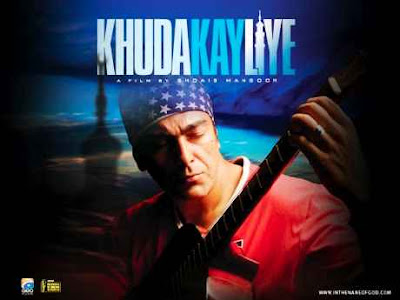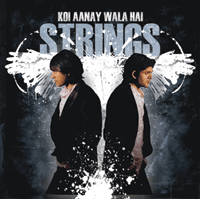
Q & A with Shoaib Mansoor
Forget making waves in India, Khuda Kay Liye has generated enough international interest for the Hollywood Reporter to be interested
In July, Shoaib Mansoor hit Pakistan's moribund film industry with his directorial debut, Khuda Kay Liye (In the Name of God). Shot in the U.K., the U.S. and Pakistan, it follows two brothers who grow apart as they follow different paths in post-September 11 Islam. In a casting coup, acclaimed Indian actor Naseeruddin Shah joined veteran Pakistani actor Hameed Sheikh, top TV actor Shan and fashion model Iman Ali in her first film role. Khuda Kay Liye grossed over $1.1 million, giving Pakistan's industry a real shot in the arm. Last month, Khuda Kay Liye became the first Pakistani film ever to release commercially in India, prompting the notoriously media-shy Mansoor to cross the embattled border for its Mumbai premiere. The Hollywood Reporter's Nyay Bhushan interviewed Mansoor in New Delhi, where they conversed in the north Indian Punjabi language, a centuries-old cultural bond between India and Pakistan.
The Hollywood Reporter: Khuda Kay Liye got good reviews in India. What were your expectations?
Shoaib Mansoor: I was curious about how it would do in India given there are more Muslims here than in Pakistan. I have also had the pleasure of meeting some leading Indian film figures who have also liked the film. I hope the film helps in clearing some misconceptions people may have of Pakistan. It's been a great experience and as of now, there haven't been any protests!
THR: You're known for co-writing the 1980s TV comedy Fifty-Fifty, loosely based on Saturday Night Live. How did you decide to shift into the troubled film industry?
Mansoor: That was exactly the reason, to do something about an industry that was never taken seriously. While I was very successful with my TV projects, I wanted to share a strong story that could really work as a feature. Even while doing largely entertainment-oriented TV projects, I still managed to include social messages.
THR: How did you face the protests against a courtroom scene in which Muslim scripture is quoted?
Mansoor: Even while we were shooting the film, some groups were already protesting. The script was heavily guarded even during production so nobody really knew the actual nature of the film. Some Muslim clerics had already drawn their conclusions that the film would be blasphemous because it was the work of an artist like me, someone who was not really a scholar. The "fatwas" were already issued, including death threats. The scene where Naseeruddin Shah plays a liberal cleric who explains some of the issues in Islam around which the film revolves, was based on facts from the scriptures which couldn't be challenged, even by hardline mullahs. So that surprised a lot of people who were against the film. Not to say that the protests and death threats didn't continue, but the film's success is what counts.
THR: The film has crucial elements shot in the U.S. including a torture scene of the lead character (Shan, playing a music student), who is mistaken for a terrorist just after 9/11. Was it tough to get American actors to participate?
Mansoor: It was very tough and frankly, I'd given up hope of finding American actors because many people refused to do the film after they read the script. But my casting director was persistent and managed to find actors even if they were newcomers with little experience (such as Austin Marie-Sayre who plays Shan's love interest) and they all did a commendable job. It was very demanding on everybody to shoot the torture scenes but that was important to the story.
THR: Shan's character says "All Muslims are not terrorists," to which an American interrogator replies, "But all terrorists are Muslims." What is your take on terrorism?
Mansoor: Terrorism is really a creation of politics. When you see the state of the world today, especially related to Muslim persecution, there are instances across the globe, from Palestine to the Middle East. Even after six decades of partition, the Kashmir issue remains unsolved between India and Pakistan. So there is just too much oppression around and this is what Shan's character also says when he points to atrocities faced by Muslims in many countries.
THR: How did you manage to cast Naseeruddin Shah when no major Indian actor has featured in a Pakistani film?
Mansoor: Since our film industry has never really progressed given we haven't produced any noteworthy films, to send a request to an Indian actor as a Pakistani film director was an uphill task. I didn't know Naseeruddin Shah but managed to contact him and send him my script for Khuda Kay Liye. He read it and called me to say he was definitely going to do the film. That gave me a lot of confidence and then we went about going through the formalities of getting him to Pakistan to shoot.
THR: How was it to get government support in Pakistan for the film?
Mansoor: A lot of the credit for the film seeing the light of day goes to President Pervez Musharraf. Even before I submitted Khuda Kay Liye to the censor board, I requested him to see the film, which he did in a special screening, after which he said that this film should be released. It was only because of his support that I could face all the protests.
THR: What do you have to say about the Indian film industry?
Mansoor: The Indian film industry has always been vibrant and its films are hugely popular in Pakistan. But I still have more complaints about the Indian industry than against Pakistani films. In Pakistan it's a known fact that things are in bad shape, with a lack of funds and innovation. By contrast, the Indian industry has more resources, a bigger market, big returns, yet, they keep making the same formula films, the same song-and-dance routine. There have been exceptions but honestly, there is need for something new. My definition of entertainment is about offering people a justification to spend a couple of hours in a cinema. A good film should not only raise questions but also offer solid answers as well.
THR: Would you consider a project in India?
Mansoor: I have had some positive discussions here so you never know, something concrete could emerge. I just hope that film ties between both countries can grow further because that is the need of the hour.
link: http://thenews.jang.com.pk/instep_today.asp



